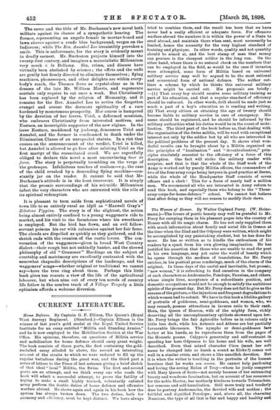CURRENT LITERATURE.
Home Defence. By Captain G. F. Ellison, The Queen's (Royal West Surrey) Regiment. (Stanford.)—Captain Ellison is the winner of last year's gold medal at the Royal United Service Institute for an essay entitled "Militia and Standing Armies," and he is now employed in the Mobilization Section at the War Office. His opinions, therefore, on questions of Militia service and mobilisation for home defence should carry great weight. The book consists of three parts, the first containing the gold- medalled essay alluded to above, the second an interesting account of the straits to which we were reduced to fill up the regular battalions during the great war, and the third part a series of letters to the Times of last autumn giving a brief sketch of that ideal " local" Militia, the Swiss. The first and second parts are an attempt, and we think every one who reads the book will admit a successful attempt, to prove the futility of trying to make a small highly trained, voluntarily enlisted army perform the double duties of home defence and offensive warfare abroad. He shows again and again in his book how the system has always broken down. The two duties, both for economy and efficiency, must be kept distinct. We have always
tried to combine them, and the result has been that we have never had a really efficient or adequate force. For offensive warfare abroad the numbers it is within the power of a State to send abroad, and maintain there when sent, must necessarily be limited, hence the necessity for the very highest standard of training and physique. In other words, quality and not quantity should be aimed at, and the best stamp of man that money can procure is the cheapest soldier in the long run. On the other hand, where there is no natural check on the numbers that can be employed in the field, as would be the ease if invasion were attempted, some form of Militia based on universal military service may well be argued to be the most rational and economical form of national defence. The author out- lines a scheme by which he thinks this universal military service might be carried out. His proposals are briefly : —(1) That every boy should receive some military training as part of his education, and that a regular standard of efficiency should be enforced. In other words, drill should be made just as much a part of a boy's education as is reading and writing. (2) That every citizen on attaining the age of twenty should become liable to military service in case of emergency. His name should be registered, and he should be informed by the military authorities what his duties would be in the event of mobi- lisation. The third part of the book before us, that dealing with the organisation of the Swiss militia, will be read with exceptional interest not only by the soldier but by all who are interested in the political problems of the present day. It shows what won- derful results can be brought about by a Militia organised on the principles of "localization" and "decentralisation," prin- ciples absolutely essential to the efficiency of a force of this description. One fact will strike the military reader with surprise, and that is that the whole of the Staff work of the Army is worked out by purely Militia officers, the commanders of two of the four army corps being lawyers in good practice at Berne, while the whole of the Headquarter Staff consists of seven officers and a clerk ! This for a force of nearly half a million men. We recommend all who are interested in Army reform to read this book, and especially those who belong to the " Three- army-corps-for-home-defence " school. We cannot but believe that after doing so they will see reason to modify their views.






































 Previous page
Previous page